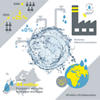The urgency of the clean water issue is already being discussed at the highest political level, particularly in the context of the UN's SDGs. SDG 6 is explicitly dedicated to ensuring the sustainable availability of water and sanitation for all. In addition, many countries have developed their own strategies to address this challenge in the face of declining regional availability of potable water globally.
But despite these efforts, national strategies often reach their limits. Water is a resource that knows no national boundaries. International cooperation is therefore needed to share the available water. This cooperation is essential to ensure the protection of clean water as the basis of life, both in terms of the quantities that are (or can be) used and in terms of the introduction of pollutants into groundwater.
The European Commission provided an example of the urgency when it stated in its "Communication on addressing climate risks in Europe" in early March that the costs of inadequate or delayed implementation of integrated water management will be unaffordable. Yet the Commission itself has indefinitely postponed the presentation of its Water Resilience Initiative until February 2024. Announced by Commission President Ursula von der Leyen in September 2023, the EU initiative aims to tackle the increasingly frequent droughts and floods that are having a devastating impact across Europe and are linked to climate change.
Another concern is the lack of attention given to water policy in some political programmes. In particular, in view of the upcoming European Parliament elections, it is noteworthy that some election manifestos do not address the issue of water. Water management should play an important role in the upcoming European elections in order to address the challenges of the water crisis.
At the same time, it is important to recognise that some southern European countries have already made progress in irrigation with treated water. To take a comprehensive view of potable water as a resource, it is advisable that the remaining European countries develop measures or follow existing solutions. In implementing the EU regulation on water reuse, Member States could consider going beyond the minimum requirements. The global water crisis demands decisive political action. If governments around the world come together and take concrete, international action to secure water supplies for all, water as a resource can be protected in a sustainable way.








